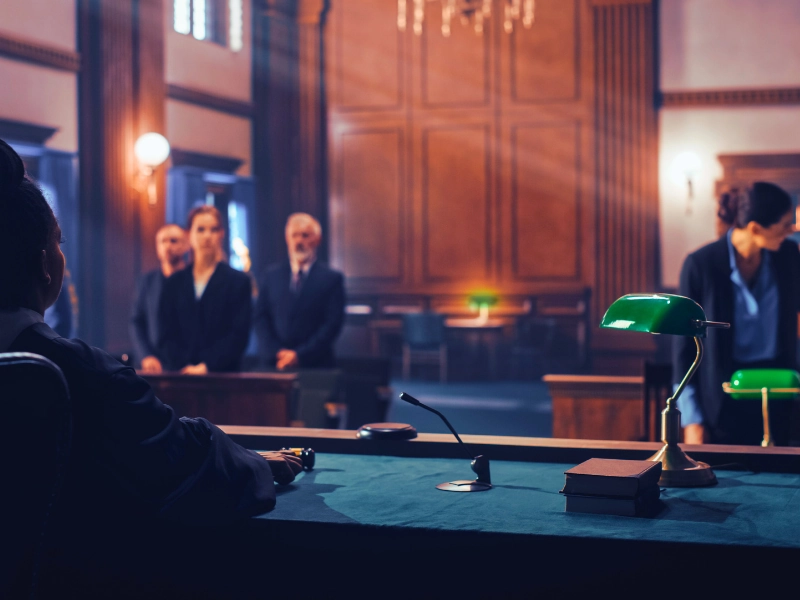What happens if a domestic violence victim doesn’t show up for court? In Minnesota, your case might still proceed even if the alleged victim fails to show up at the trial. The victim lacks the power to decide whether to initiate or continue criminal proceedings against you. That power lies with the prosecutor. The prosecutor can carry through with the case even without the victim’s involvement.

Table of Contents
What Happens if a Domestic Violence Victim Doesn’t Show up for Court in Minnesota?
A domestic violence victim can get arrested if he or she receives a subpoena and declines to appear in court. The victim could also face charges for making a false police report if the victim appears in court and states on oath that the violent incident never happened. If so, the prosecution might drop the domestic violence charges against you.
The prosecution can choose to prosecute the domestic violence case if the victim fails or refuses to attend court sessions. A domestic violence conviction is still possible even without the victim’s testimony. The prosecutor can use the police report, medical records, surveillance camera footage, and other witnesses’ statements to try to prove that you committed the crime.
What Happens if the Victim Refuses to Testify?
The prosecutor typically subpoenas the victim, which commands the victim to testify. The prosecutor can press domestic violence charges against you even if the alleged victim declines to testify.
If a legal marital relationship exists between you and the victim, the victim may be able to assert spousal privilege and refuse to testify. Your spouse has the privilege to remain silent if he or she claims marital spousal privilege properly. In that case, the prosecutor must review other available evidence to determine whether it is worth moving forward with the prosecution. If not, your charges might get dropped.
Understanding Spousal Privilege
Spousal privilege allows spouses to refuse to provide evidence or testify during any legal proceeding, unless an exception exists. Minnesota has two categories of spousal privilege:
Spousal Communications Privilege
Spouses can claim spousal communications privilege during civil and criminal proceedings. This privilege protects confidential communications made during a legal marriage. The main function of this privilege is to prevent the exposure of private statements between legally married couples to the public.
A spouse must prove certain aspects to assert a spousal communications privilege, including that:
- The communications happened during a legitimate marriage;
- The purpose of the communications was to exchange information between spouses;
- Neither party has revealed the details of the communications to a third party; and
- The communications were private and confidential.
This privilege applies even after the end of a marital relationship. It does not shield communications that happen after the marriage, and it doesn’t apply if a spouse files a civil or criminal suit against the other.
Spousal Testimonial Privilege
This privilege bars the prosecution from forcing one spouse to testify against the other spouse in a criminal trial or jury proceeding. Either spouse can claim this privilege. A valid marital relationship must exist at the time that the spouse claims the privilege. The prosecution can compel your ex-spouse to testify against you if the two of you are no longer in a marital relationship.
Exceptions to this privilege apply when a spouse initiates a civil proceeding against the other spouse. Exceptions also apply when one spouse sues the other for a criminal act like domestic violence.
When Can the Prosecutor Decide Not to Prosecute a Domestic Violence Case?
Lack of sufficient evidence may be how your domestic violence case could get dismissed. The prosecutor may opt to drop charges if a conviction is unlikely without evidence or testimony from the victim. Purely Circumstantial Evidence
Without the victim’s testimony, the prosecutor may only have circumstantial evidence. Let’s say a police officer testifies about seeing scratches and wounds on the alleged victim. The prosecutor argues that this is evidence of domestic violence. You (or your lawyer) could provide alternative explanations. For example, you can provide evidence that the victim tripped on an item on the floor and that’s where he or she acquired the scratches.
Invoking the Fifth
Your lawyer may advise you to invoke the Fifth Amendment, especially when the prosecutor lacks the alleged victim’s testimony. Doing this allows you to decline to answer questions or disclose self-incriminating information. It also leaves the prosecutor with no way to challenge other justifiable explanations that do not necessarily involve you engaging in the violent act.
No Relevant Past Convictions
The prosecutor will check your criminal record before deciding whether to continue with your case. If you have prior domestic violence convictions, the prosecutor may bring this fact to the jury’s attention. The prosecutor may decide to drop the charges if you have a clean record and the available evidence is insufficient.
Even if the prosecutor chooses to continue with the case, you might get a better plea deal, one that would have been unlikely if the victim’s testimony was available. For instance, you may get a disorderly conduct charge that carries lighter penalties in exchange for your guilty plea. Ensure that you thoroughly evaluate all your options before accepting a plea offer.

Getting your charges dropped is hard, even when the domestic violence victim does not show up at the trial. But you can increase your chances of getting the charges dropped or obtaining a favorable outcome in your case by working with a domestic violence lawyer.
A lawyer skilled in Minnesota criminal law can poke holes into the police procedures and credibility of the statements from the victim and witnesses. The lawyer can push for leniency. In this situation, the lawyer may cite your clean records, the victim’s statements, the absence of serious injuries, and the impact of prolonged jail time or hefty fines on minor children. Your lawyer can also help you obtain a better plea offer.





